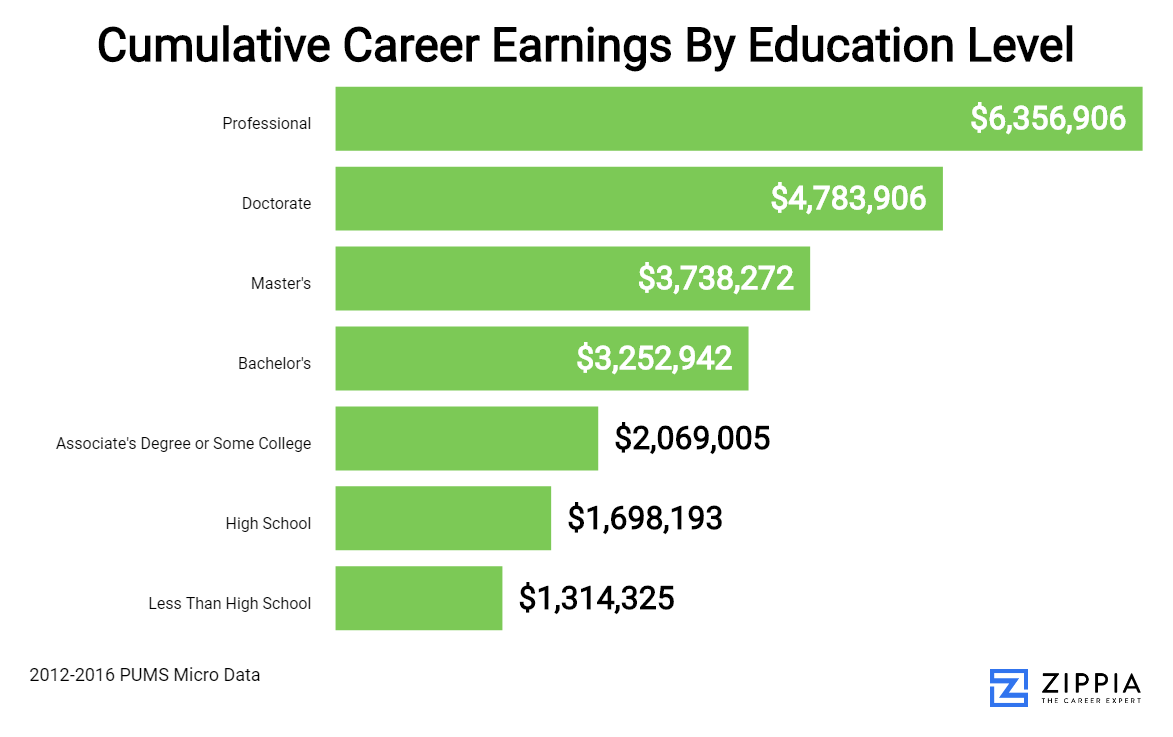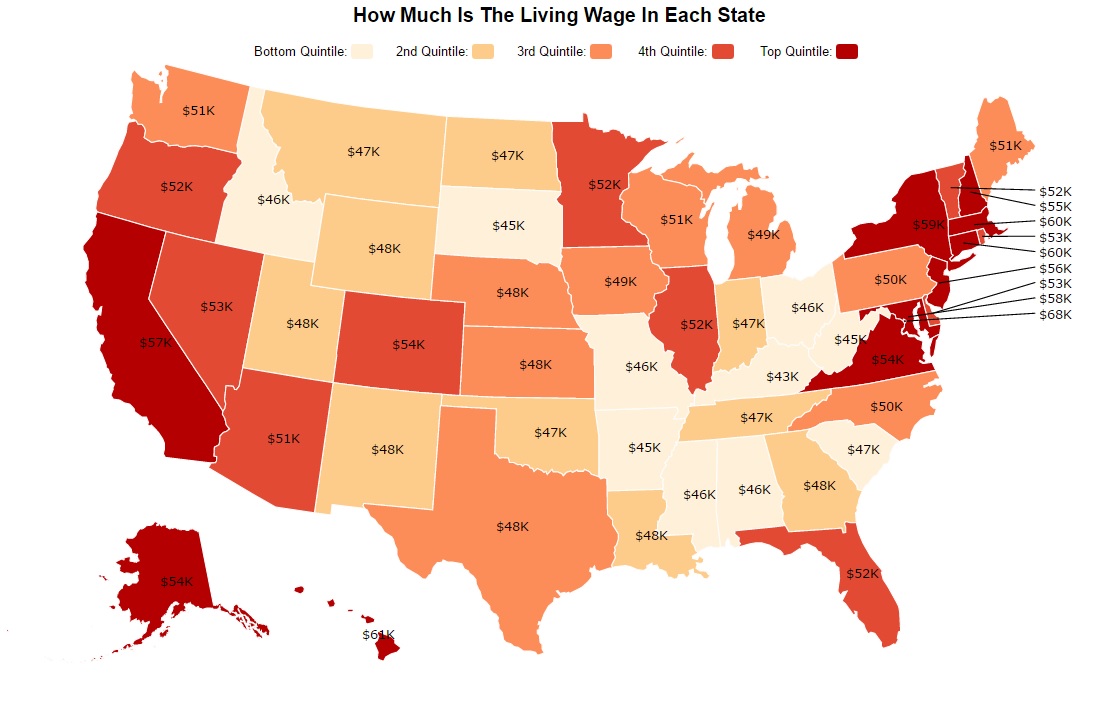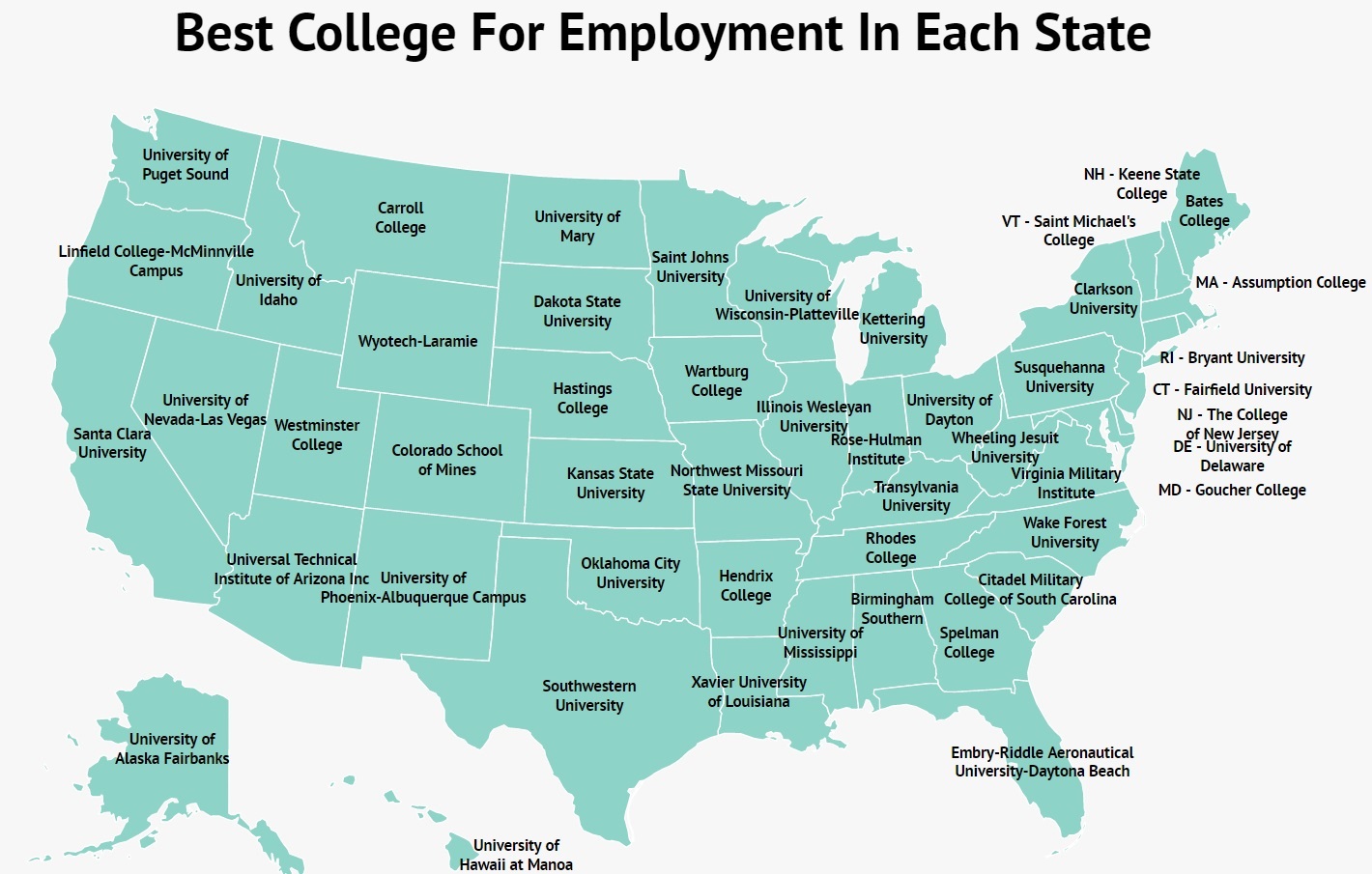What does one more step up the educational ladder do for your career earning potential?
Or, perhaps more practically, what's the ROI (Return on Investment) of going to college or getting a master's degree?
On average, the ROI for every step in your educational journey is positive -- getting another degree will justify the cost over the course of your career. Interestingly, there is no expiration date for advancing your education. The ROI is positive very late into your career, making going back to school a smart decision for almost everyone except lawyers and doctors.
You may be thinking that getting a masters or a PhD is not your cup of tea, but it's important to remember that each step along the way matters. In fact, going from less than high school to a GED is a better ROI than getting a masters after college.
Here's a look at how career earnings improve with your level of education:
The Average Arc
We started by looking at what an average earner makes each year of their career using Census PUMS Microdata.
Grouping together workers by age, you can see how an average person's income rises throughout their mid-forties where it plateaus until retirement.
This may look familiar as we started here with our analysis of dead end careers.
The Impact Of Education
When we break down incomes by education, it becomes clear that more education equals higher earning potential.
However, the percent increase varies from degree to degree.
The Biggest % Jump
What really stood out to us was the percentage increase in earnings between certain levels of education.
The most glaring is going from a bachelor's to a professional degree (lawyers mainly). That's a 95% increase in lifetime earnings, on average, worth a cool $3,100,000.
The Jump That's In The News
The job in earnings everyone talks about is from a high school degree to a bachelor's.
Assuming you don't saddle yourself with crippling debt and complete the degree, you're looking at an average increase in lifetime earnings of 91.5% percent -- worth $1,500,000 in absolute terms.
The Most Underrated Step In Your Education
It may not look very impressive visually here, but get your GED.
Finishing High School really helps your career earnings with a bigger percent increase than getting a masters after college.
If you make the jump all the way to an associates your ROI is better than getting an MD after college.
Calculating The ROI On Education

While the graphs above make it seem like everyone should become a lawyer -- figuring out your personal ROI to education isn't that straightforward. Specifically, it's all in nominal terms that fails to account for inflation and how that impacts earnings over your career.
Plus, there are plenty of lawyers that fail to make the average salaries listed above.
So it's important to calculate your personal ROI of obtaining the next level of education given the following conditions:
- Your age -- the older you are the less time you have to "earn" back the cost
- The direct cost -- tuition, classes, etc.
- Opportunity cost -- the money you could have earn while you go back to school
- Inflation and the time value of money -- money earned today is more valuable than money earned five years from now
As you can see, the calculation gets rather complex quickly and doesn't even take into account what exactly you are going back to school for or the overall job market when you get out.
Additionally, because the shape of the graph peaks later in life, you earn an especially big premium on your education as you age. This makes advancing your education even later in life potentially worth it if you plan to retire at an older age.
With that in mind, we tried to account for the variables listed above in the following calculator. Is getting that next degree worth it for you?
What's Your ROI On Education?
Details
Detailed Education ROI Calculator Methodology
The data for the calculator comes from the 2012-2016 American Community Survey PUMS data set. We modeled the average wage for a full-time working person for each level of education between the ages of 25 and 66.
Before age 25 most people are still finishing their degrees and after age 66 most people retire and the data starts to get thin.
Full-time work means someone who worked an average of 35 hours a week during the previous twelve months.
We then made the following assumptions on the cost of each level of education using the sources linked below:
- High School: $1,000
- Associate's Degree: $30,000
- Bachelor's (Public School): $60,000
- Master's: $40,000
- Doctorate's: $40,000
- Professional: $100,000
The costs to education are not all linear, for example you won't necessarily need an associates to get a bachelor's or a master's to get a professional degree.
The opportunity cost of going to school was accounted for by taking the average salary you'd earn based on the PUMS data during your years of school and adding that to the cost of going to school. Here's how many years we estimated each step to take:
- High School: 2
- Associates: High School + 2
- College: High School + 4
- Master's: College + 2
- Doctorate: Master's + 3
- Professional: Master's + 1
Finally, we accounted for the time value of money using a 3% inflation rate calculated annually.
Important Caveats To Keep In Mind
It's important to realize that these are averages for most every metric we look at. There's a band of probability around your future earnings potential based on things like:
- What school you go to
- Your current earnings
- What major or subject matter you want to learn
The takeaway? More education nets higher lifetime earnings on average, but make sure to account for variables specific to your situation.





